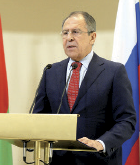President of Belarus Alexander Lukashenko meets Russian Foreign Minister Sergey Lavrov, confirming that our two states share views on key contemporary problems
The serious drama of the Ukrainian problem continues to draw major attention, with Mr. Lukashenko admitting that tension on the common border of the Belarus-Russia Union State arouses concern. The West is expanding its activity, while the situation in Ukraine is worsening, not only in Donbass, but countrywide. Minsk had hoped that, after the elections, the situation would stabilise, but this is far from the case.
“The problems are indivisible: our problems are your problems while your problems are our problems. Those include pressure on Belarus, which doesn`t leave the Russian Federation indifferent, and naturally there is the pressure on the Russian Federation, which has enough problems as it is. Therefore, this tangle of problems, evolving around us, is primarily the concern of our ministries of foreign affairs, and weighs heavily upon the situation in Belarus and naturally in Russia. We cannot but be concerned,” the President of Belarus stated, to which Mr. Lavrov replied, “We share your assessment of what is happening in Ukraine and would like to see the direct dialogue launched here, in Minsk, resume after the elections — on a new footing. The Minsk agreements are now, perhaps, the only aspect supported by all, without exception: Ukrainian parties, Russia, Belarus and, naturally, the European Union, as well as the United States.”
The Minsk Process, as political experts are calling it, is far from having settled the conflict, to Moscow’s concern. The main task is to resume dialogue. The Russian Minister notes that South-East Ukraine has publicly announced its readiness and that a similar gesture is hoped for from Kiev. However, recent decisions on substantial socio-economic restrictions and the suspension of the banking service in the South-East are insurmountable obstacles for the resumption of the Minsk Process.
 Mr. Lavrov believes that the main task at this stage is to create conditions for the resumption of dialogue on Ukraine, following the Minsk format. He added, “This is the only format under which the parties to the conflict can sit together at a negotiating table, following the Minsk Protocol and Minsk Memorandum. We’d like to see each item of these documents fulfilled scrupulously.”
Mr. Lavrov believes that the main task at this stage is to create conditions for the resumption of dialogue on Ukraine, following the Minsk format. He added, “This is the only format under which the parties to the conflict can sit together at a negotiating table, following the Minsk Protocol and Minsk Memorandum. We’d like to see each item of these documents fulfilled scrupulously.”
Mr. Lavrov underlines that Russia is focused on ensuring the interests of Russia and Belarus within the framework of the Union State. The joint meeting of the two foreign ministries reviewed, among other important issues, the situation in Europe (in the context of relations between Russia and Belarus) and the European Union (in the context of joint work with the Organisation for Security and Co-operation in Europe), according to Mr. Lavrov. He added that the Ukrainian theme has ‘come to symbolise the discharge of contradictions that have accumulated over the past couple of decades’. He asserted that these are ‘contradictions in the sphere of security’ and show ‘the inability of our western partners to abandon dividing lines and create a unified, common space of equal security, and equal economic and humanitarian co-operation’. He believes that the crisis is far from over.
As far as bilateral relations are concerned, these are operational at a high level. Belarus and Russia are starting the New Year virtually without problems in their relations — even minor ones. Mr. Lukashenko expressed his support for the President of Russia, Vladimir Putin, and the Head of the Government, Dmitry Medvedev, while Mr. Lavrov said that the Russian President had asked him to express similar words to his Belarusian colleague.











